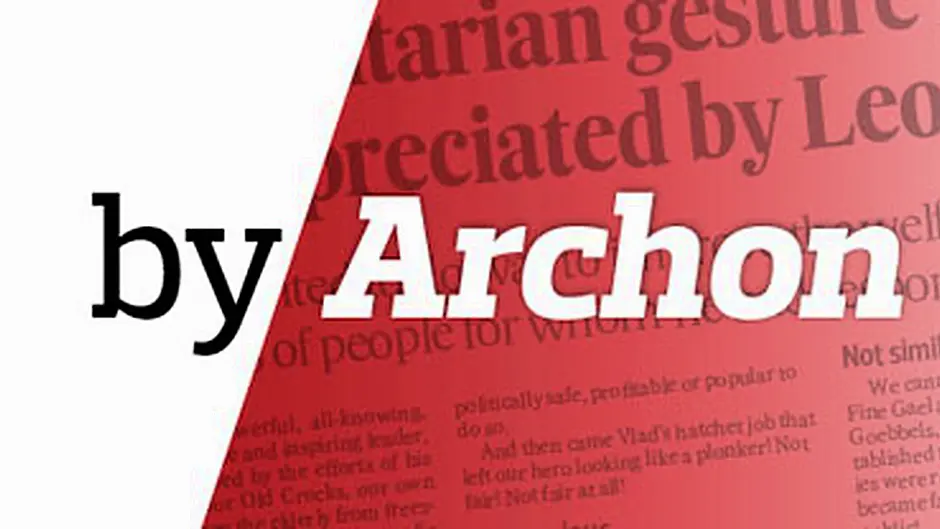WITH Bashar al-Assad successfully pounding the lard out of the most bloodthirsty creatures known to mankind, it's a matter of concern to Law and Order Minister, Charlie Flanagan, that among the Islamists are Irish citizens.
WITH Bashar al-Assad successfully pounding the lard out of the most bloodthirsty creatures known to mankind, it’s a matter of concern to Law and Order Minister, Charlie Flanagan, that among the Islamists are Irish citizens. Not that he wants to rescue the sods but he’s conscious of the threat they’ll pose, should they ever get back to this country.
Earlier this month news surfaced that one such Irish citizen was captured by the Kurd-led Syrian Democratic Forces (SDF) in eastern Syria and accused of being a member of Isis.
The Irish passport holder was accompanied by two Americans and two Pakistanis who were trying to avoid Syrian Government forces; as well they might, considering that jihadi hordes committed atrocities such as public executions, beheadings, crucifixions, abductions, burnings and slavery as part of their strategy to eradicate obstacles preventing the establishment of an Islamic state.
Interestingly, through his involvement in fundraising while living in this country, the captured Irish citizen had come to the attention of Gardaí. And he wasn’t the only extremist.
In 2017 three jihadi sympathisers were arrested and, according to Gardaí and sources in the Muslim community, over the past six years around 30 Irish citizens travelled to Syria and Iraq where they joined military outfits trying to obliterate Syria. Gardaí are not sure as to how many Islamic loonies returned, which is worrying.
‘A lone wolf’
An interesting case is that of Waterford man, Hassan Bal. In the first prosecution of its kind in Ireland, he was jailed for two and a half years after being caught raising funds for Isis. The money was to be spent on guns, clothes and sex slaves.
Gardaí described him as ‘a lone wolf’ and stressed that his activities did not reflect the views of the Muslim community in Waterford.
Then there was Algerian-born Ali Charaf Damache, currently serving 15 years in the US for being the ringleader of a jihadi cell that was plotting attacks in Europe and Asia. He too was an Irish citizen.
He lived in Waterford, married an Irish lady and gained citizenship in 2008. Arrested in this country in January 2010, he was charged with sending a menacing phone call to a US Muslim activist. He got four years’ imprisonment.
Following lengthy extradition proceedings, the High Court refused to order his surrender to US authorities. (While in Cork prison he alleged his constitutional rights to privacy, dignity and the ability to practice his
religion were breached).
He was released on appeal and made a fundamental error. He went to Spain where the authorities were less benign than their Irish counterparts.
They extradited him promptly to the United States where he faced a possible 45-year prison sentence. This induced him to plead guilty to terrorism charges and he was sentenced last October to 15 years in jail.
However, it has since been revealed that once Damache serves his sentence he will be extradited either to Algeria or to this country where he has rights as an Irish citizen.
No loyalty to Ireland
The response from Justice Minister Flanagan was clear. Under no circumstances would Damache be allowed return to Ireland.
And then the Minister made a move that probably will have constitutional repercussions. Lawyers on the State’s behalf filed papers in the High Court seeking to revoke Damache’s citizenship on the grounds that he failed in his duty of loyalty and fidelity to Ireland.
Under the law, if an immigrant obtains citizenship by naturalisation, the privilege can be withdrawn if fraud, misrepresentation or the concealment of relevant facts were involved. Citizenship can also be revoked if the person fails in one’s duty of fidelity to the nation and loyalty to the state. Flanagan is arguing that Damache failed in his duty and loyalty by committing a terrorist act.
The official withdrawal of Irish citizenship by the State rarely happens and, up to this, never for political reasons. Since 2015 there were five cases, but all of these related to certificates of naturalisation that had been obtained by fraud.
Needless to say, the arguments for and against the revocation of Irish citizenship are complex and controversial. Dr Edward Horgan, former UN peacekeeper and well known peace activist, urges caution when dealing with the issue.
He argues that the move ‘singles out one particular group who choose to take a particular side in these conflicts while ignoring many others, including Irish citizens who go abroad to fight in these same conflicts but choose to fight on the other side.’
He asks if we should ignore Irish citizens who leave Ireland and join British, French or US armies?
Revoking Irish citizenship
Horgan argues that the solution ‘may well be to make a radical change in the Constitution, whereby after a specified date, any Irish citizen who joins any foreign army or armed militia group would automatically lose Irish citizenship.
‘If this were enacted, then the revoking of their Irish citizenship would be implemented by the person themselves on their joining a foreign army or militia. It would also have the beneficial results of preventing neutral Irish citizens from unjustified killing of our fellow humans.
‘This prohibition should also apply to Irish citizens joining any NATO or European Union army. The only exceptions should be genuine United Nations peacekeeping.”
Interestingly, Dr Umar Al Qadri, chairperson of the Irish Muslim Peace and Integration Council, thinks new Irish citizens who take part in conflicts abroad should not be accepted back in Ireland and should have their citizenship revoked.
Question is, what constitutes a loyal Irish citizen? And how does one define dangerous political views? After all, one man’s terrorist is another’s freedom fighter – a fact that has long been a feature of Irish democracy, although the implications yet have to be spelt out within the context of religious fanaticism.
Kicking out extremists
In the old days, citizenship was loosely defined as the status of a person recognised under law as being a legal member of a sovereign state, or belonging to a nation. But such a concept seems increasingly out of date because of the abhorrent crimes against humanity committed by Islamists.
In Australia pressure is growing to ‘kick extremists out of the country,’ if it can be established that Aussies identified as ‘serious terror threats’ could claim citizenship somewhere else – such as countries that were the birthplace of parents or grandparents.
The Chair of the joint Standing Committee on Migration, Jason Wood, recently declared that, as far as he was concerned, ‘if you put your hand up to say you uphold the rights and responsibility of Australian citizenship, but the next minute you want to talk jihad all day, it’s a breach of contract and you need to go.’
Is Minister Flanagan getting his ideas from the Antipodes?









